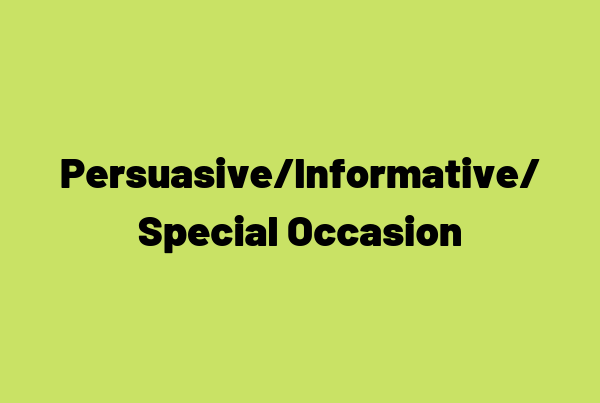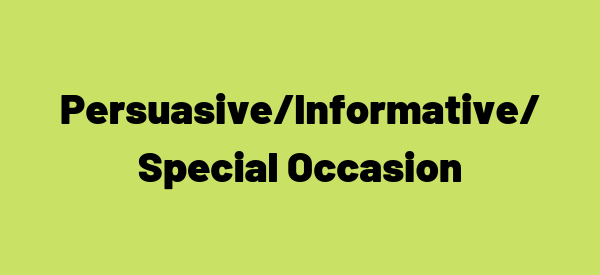
Public speaking is an amazing art. It becomes even more amazing when a speaker has a specific objective in mind in regards to their speech.
These objectives can range from a variety of things that a speaker would like to get out of a speech. However, there are 3 core categories of speeches that encompass most of the ideas speakers would like to convey: informative, persuasive, and special occasion speeches.
Informative
Informative speeches are speeches that are meant to inform an audience of a specific message. They aren?t intrinsically designed to get an audience to believe a certain opinion or viewpoint, but rather inform them of all the relevant details about a particular topic.
Many speakers use informative speeches by trying to remain neutral about their own beliefs and allowing the information they provide to create an opinion for an audience. The speaker would try to allow their audience to internalize the information being presented and then let them come to their own conclusion.
When people believe that they figured out why they believe in what they believe, they are more likely to feel fulfilled about their beliefs. People don?t like to be influenced by other people.
Sometimes the information provided can be very obvious in terms of the conclusion it?s pointing to and not even require any persuasion, but informative speeches aim to simply inform.
Persuasive
Persuasive speeches are intended to get an audience to believe in a certain topic or ideology. They can be extreme or simple in their approach to convince an audience, but they have a goal of getting people to buy into the words being spoken.
These are the hardest speeches because it is hard to convince people of anything. This is especially true when you asked them to challenge their current belief system and get them to think of perspectives outside of that. While most speakers succeed in getting people to think outside their current viewpoints, few actually persuade people to believe in the messages they are spreading. Persuasion requires knowing the inner depths of making people believe in you. Most people can?t persuade.
While these are the hardest types of speeches ? they are still the most influential. Persuasive speeches start movements, encourage hope, and give people something to believe in that can allow them to find purpose and meaning in their lives. The same speeches can also do that exact opposite. That?s why persuasive speeches are scary.
Special Occasion
Special occasion speeches have no set format. They are speeches that are intended to fit the special occasion, whether that be graduation, birthday party, or funeral.
These types of speeches may be informative or persuasive, but the important thing to remember is that they should fit the context of the occasion in order to effectively communicate their message.
A graduation speech shouldn?t be 30 seconds. A birthday party speech shouldn?t be 30 minutes. Time, place, and context are what allows these speeches to be effective and grab an audience?s attention.
Regardless of what speech you are trying to give, understanding the purpose and meaning of the speech before you construct it can immensely help you communicate the message you would like to spread. Before giving a speech, ask yourself about the purpose of it. Figuring that out will fundamentally change the trajectory of the speech?s effectiveness.
If you would like to gain more tips on public speaking, subscribe to my youtube channel here. You can DM me on Instagram here for any specific questions!


